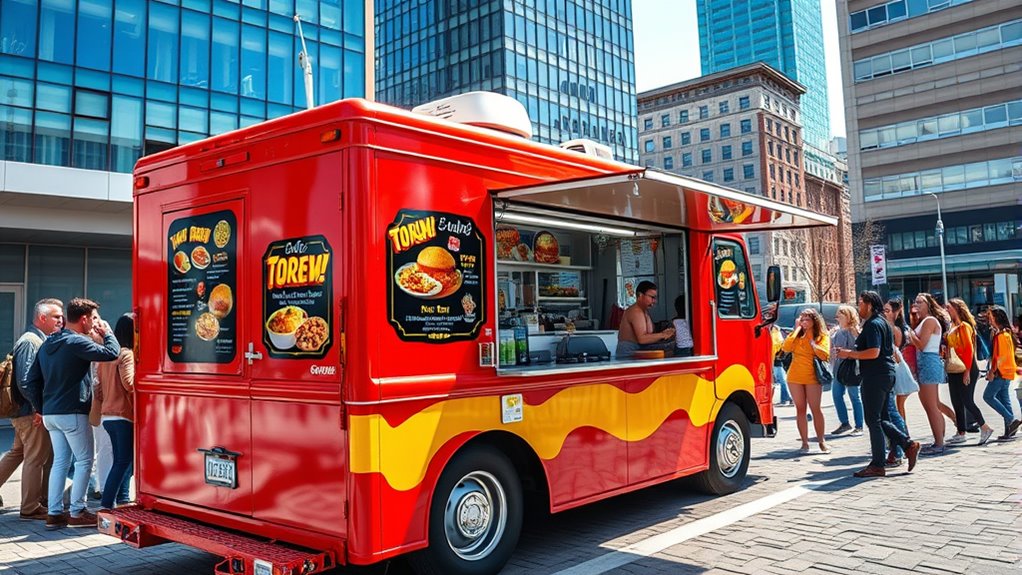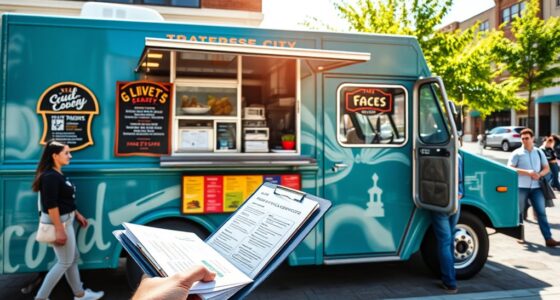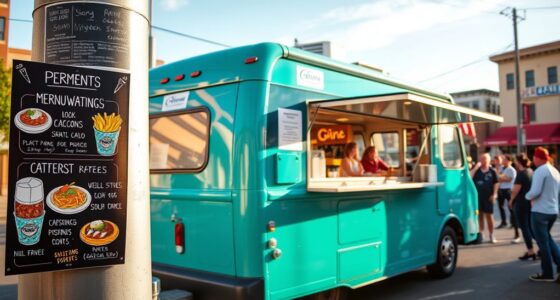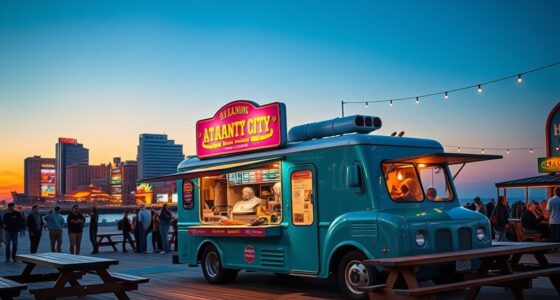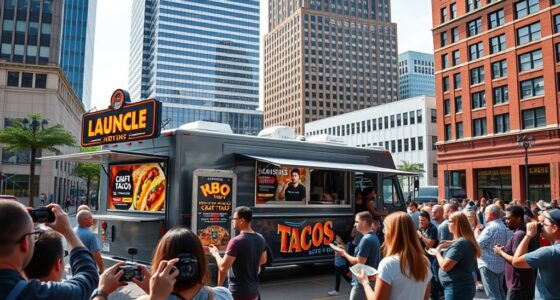To open a food truck in Newark, you’ll need to secure permits from the city’s Central Licensing Unit, including vendor, health, fire, and parking permits, with costs ranging from a few hundred to over a thousand dollars annually. Choose high-traffic locations like Newark Penn Station or Downtown, craft a unique menu, and develop a marketing plan focused on local events and community engagement. Keep compliance in mind to guarantee smooth operations; more details await your exploration.
Key Takeaways
- Obtain necessary permits and licenses from Newark city hall, health, fire, and state agencies, including vendor licenses and zoning approvals.
- Budget $35,000–$100,000 for vehicle, equipment, permits, insurance, and initial operating costs.
- Target high-traffic locations like Newark Penn Station, Prudential Center, and community events for maximum visibility.
- Develop a diverse, health-conscious menu with seasonal options, and enhance marketing through social media and local partnerships.
- Ensure compliance with all safety, health, and business regulations, and adapt menus to seasonal trends and community needs.
Navigating the Permitting Process in Newark
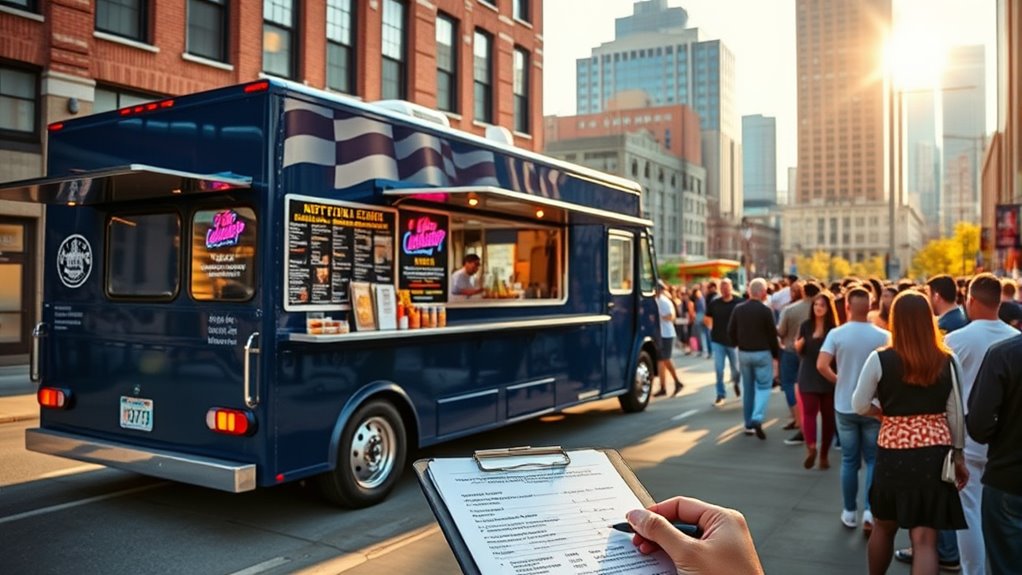
Guiding the permitting process in Newark requires you to understand and complete several key steps to operate legally. First, you must obtain a vendor license through the Central Licensing Unit at City Hall, which involves submitting an application and paying fees. If you plan to sell at special events, you’ll need separate event permits. All food trucks must register with the NJ Division of Revenue and Enterprise Services, especially if you have employees or multiple owners, and verify your business name is correctly registered based on your structure. You’ll also need health and fire department inspections to verify food safety and safety systems like fire suppression. Additionally, securing parking permits and zoning approvals for your designated vending zones is essential to avoid fines. Proper registration, inspections, and permits keep you compliant and ready to operate smoothly. Incorporating proper licensing procedures and understanding local regulations is essential to establishing a successful food truck business in Newark.
Estimating Your Startup Expenses
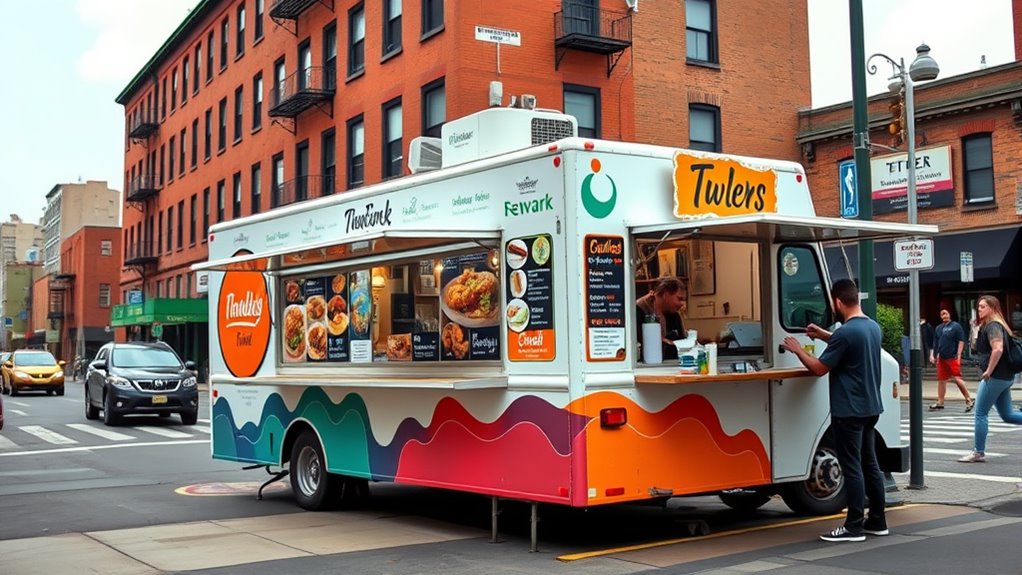
Estimating your startup expenses is essential to launching your food truck in Newark, NJ. You’ll need to account for vehicle and equipment costs, which can range from $20,000 to over $150,000, and permit and licensing fees that vary widely. By understanding these costs upfront, you can create a realistic budget and plan for a successful start. Additionally, it’s important to factor in ongoing expenses like insurance, fuel, and marketing to ensure long-term sustainability. Startup costs range from $35,000 to $100,000 depending on your choices and scale. Considering the cost of permits and licensing early on can help prevent unexpected expenses that might disrupt your planning process.
Startup Equipment Costs
Starting a food truck in Newark requires careful planning of your equipment costs, which can vary widely depending on the truck’s size, condition, and your menu. New trucks typically range from $50,000 to $150,000, while used ones are $20,000 to $80,000. Leasing options cost around $2,000 to $3,000 monthly. Custom branding, like wraps, runs $2,500 to $5,000, with paint jobs up to $15,000. Outfitting the truck with shelving and storage can add $5,000 to $8,000, and electrical systems may cost $10,000. Essential cooking equipment, such as grills and fryers, ranges from $1,500 to $6,000 each. Overall, initial equipment investments typically fall between $20,000 and $40,000, depending on your menu and setup. Additionally, understanding the butter production process can influence menu choices, especially if incorporating dairy-based items or specialty spreads.
Permitting and Licensing Fees
Setting up your food truck in Newark involves securing various permits and licenses that guarantee compliance with local regulations. Expect to pay between $150 and $250 for your business registration with the New Jersey Division of Revenue. Food truck permits from Newark cost $200–$500, while health inspections range from $100–$500 annually. Fire safety inspections and certifications add another $50–$200, plus a $75 Fire Certificate renewal. Police warrant checks are $20, and a Peddler’s License from City Hall requires additional fees. To visualize costs, it is important to understand the Effectiveness of Eye Patches, which can inform your skincare routine and enhance your appearance when needed.
| Permit/License | Cost Range | Renewal/Notes |
|---|---|---|
| Business Registration | $150–$250 | One-time |
| Food Truck Permit | $200–$500 | Annual renewal |
| Health Inspection | $100–$500 | Annual |
| Fire Safety & Certificate | $50–$200 | Annual renewal |
| Police & Peddler’s Lic. | $20–$75 | One-time or annual renewal |
Identifying Prime Locations for Your Food Truck
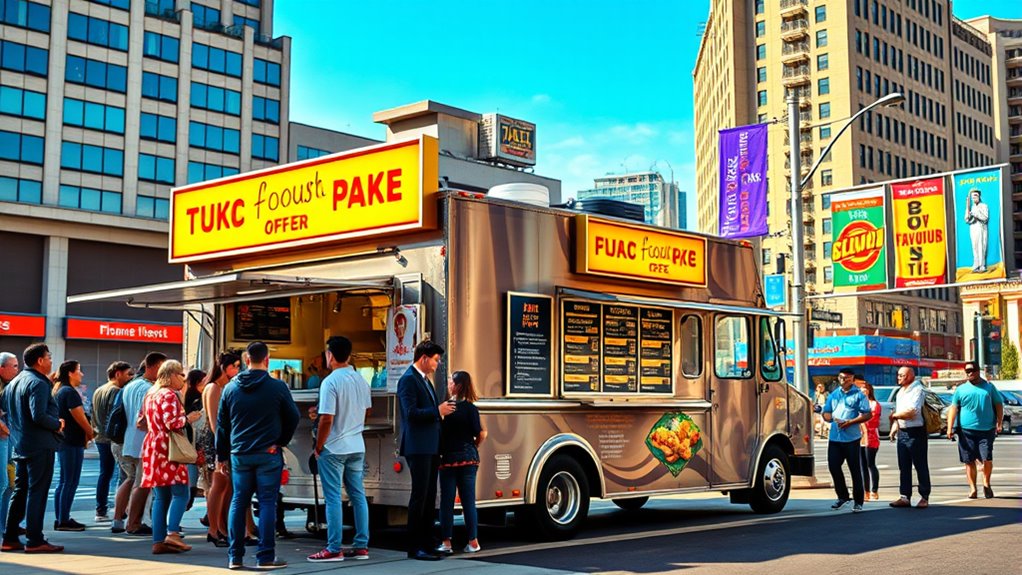
To find the best spots for your food truck, focus on high-traffic neighborhoods like near Newark Penn Station or the Prudential Center, where crowds gather regularly. Attending local events and festivals can also boost visibility and sales on busy days. Make sure your location is easily accessible with proper parking and permits to keep operations smooth. Additionally, utilizing an interactive map of Newark can help you identify food truck locations and plan your routes more effectively. Recognizing soulmate angel numbers such as 1234 or 5353 can also inspire your branding and marketing strategies to attract more customers seeking meaningful connections.
High-Traffic Neighborhoods
Identifying high-traffic neighborhoods is essential for maximizing your food truck’s visibility and sales. Newark offers several prime areas with heavy foot traffic:
- Downtown Newark – the hub of business, culture, and entertainment attracts large crowds daily.
- Ironbound District – walkable with vibrant nightlife, dining, and events, drawing steady crowds including commuters.
- University Heights – home to Rutgers and NJIT, generating consistent daytime foot traffic from students and staff.
- Forest Hill & Four Corners – residential areas near parks and redevelopment zones see increased activity from residents and visitors. Recent safety concerns have led to shifts in pedestrian patterns, making it important to consider areas with active community engagement.
Focusing on these neighborhoods ensures you’re in locations where people naturally gather, boosting your chances of success and steady sales.
Event & Festival Spots
Ever wonder where to position your food truck for maximum exposure? Attending major food festivals in Newark, like the Downtown Newark Food Truck Festival at Canal Market District or the city parks’ international food events, boosts your exposure to large, diverse crowds. These festivals attract families, young professionals, and cultural communities, offering ideal opportunities to showcase your menu. Timing matters too—summer and early fall festivals from May to October provide peak attendance, especially on weekends or holidays. Festivals with open-air layouts, entertainment, and established infrastructure make setup easier and enhance customer experience. Participating in these events helps build brand recognition, attract loyal customers, and expand your reach beyond Newark to nearby towns hosting food truck festivals from September to November. Incorporating sustainable practices into your participation can further resonate with eco-conscious attendees and enhance your brand image.
Crafting a Menu That Attracts Customers
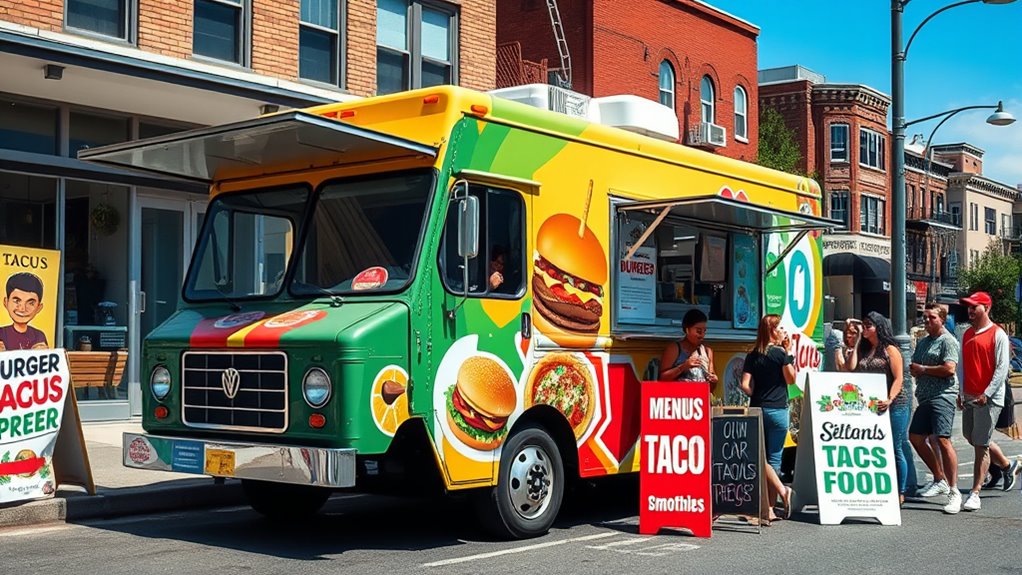
Crafting a menu that attracts customers requires balancing variety, freshness, and storytelling. To stand out, consider these strategies:
- Offer customizable options like burgers with meatless and veggie choices, appealing to diverse tastes.
- Include healthy and unique items such as sushi, attracting health-conscious and curious travelers.
- Add plant-based dishes like falafels, tapping into the growing vegan and vegetarian markets.
- Incorporate nostalgic desserts like funnel cakes and churros to differentiate your truck and evoke comfort.
- Prioritize high-quality ingredients and innovative combinations to keep your offerings fresh and appealing, encouraging customers to return regularly.
- Incorporate knowledge of local regulations and seasonal changes to adapt your menu and ensure compliance, making your offerings more relevant and sustainable.
Additionally, emphasize sustainability with eco-friendly packaging and local ingredients. Highlight health-conscious options like keto, paleo, and gluten-free dishes, and keep menus fresh with seasonal items and limited-time promos. Use engaging visuals and storytelling to forge emotional connections and encourage repeat visits.
Developing an Effective Business and Marketing Plan
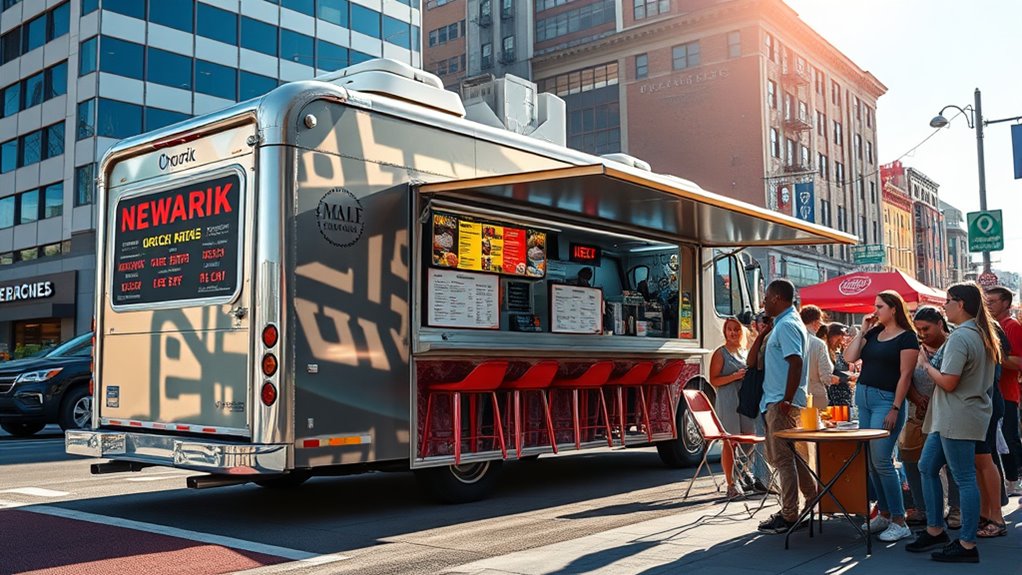
Developing an effective business and marketing plan is essential for the success of your Newark food truck. Start with an executive summary that highlights your unique offerings and target demographics, emphasizing what sets you apart. Conduct a thorough market analysis to understand local demand, customer preferences, and competitors’ strengths and weaknesses. Your operational plan should detail daily procedures, supplier relationships, equipment needs, and maintenance schedules. Financial planning involves projecting revenues, costs, startup expenses, and establishing milestones for profitability. For marketing, focus on local channels like social media, community events, and partnerships with nearby businesses. Create a compelling brand identity tailored to Newark’s diverse culture. Regularly analyze marketing results and adapt your strategies to boost visibility, customer loyalty, and growth. Additionally, understanding the different types of cookies and their impact on user experience can help inform your online marketing and website strategies to better connect with your audience.
Ensuring Compliance and Operational Readiness
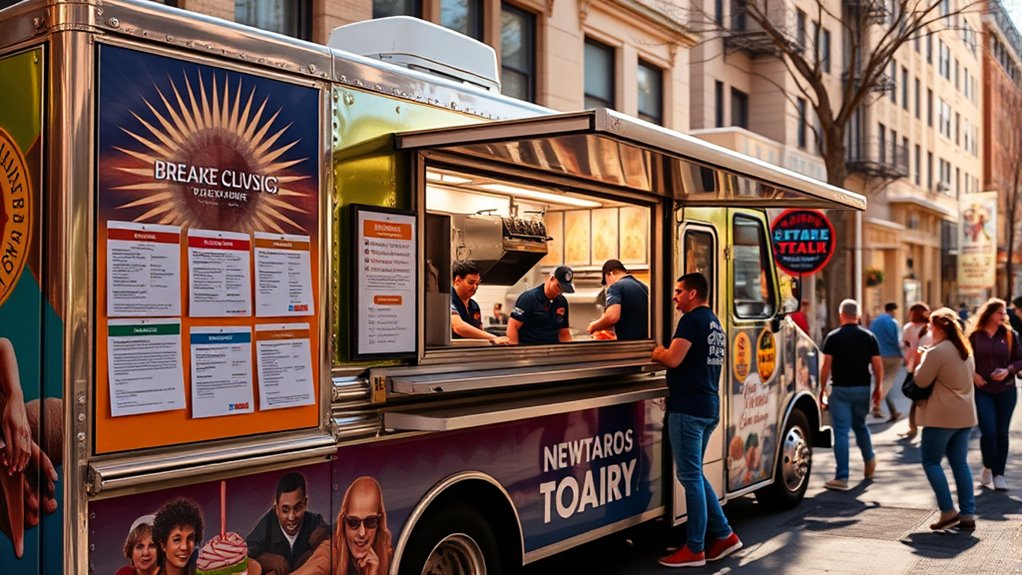
To operate a food truck successfully in Newark, you must prioritize compliance with all local, state, and federal regulations. Here’s what you need to focus on:
Successful Newark food trucks prioritize compliance with local, state, and federal regulations to ensure smooth operation.
- Register your business with the New Jersey Division of Revenue and obtain an EIN if you hire employees or form a corporation.
- Secure necessary permits, such as vendor licenses, parking permits, and possibly alcohol licenses if you plan to serve alcohol.
- Ensure fire safety compliance by meeting propane storage limits and scheduling annual inspections.
- Maintain proper insurance coverage, including commercial vehicle and liability insurance, to protect your business and meet permit renewal requirements.
- Consider the costs of compliance and how they can impact your overall budget and planning process.
Staying on top of these requirements guarantees your food truck operates smoothly and legally within Newark’s vibrant food scene.
Building a Strong Community Presence
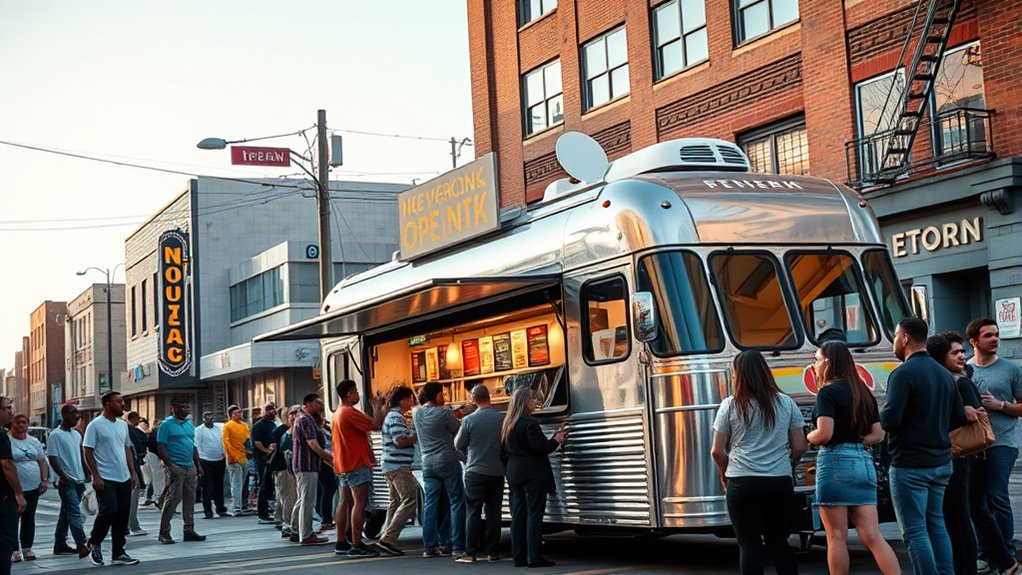
Building a strong community presence is essential for your food truck’s long-term success in Newark. Partner with local nonprofits and food security initiatives to support urban agriculture, host events at community gardens, and participate in neighborhood programs. These collaborations foster trust, improve food access, and strengthen neighborhood ties. Community engagement strategies can enhance your relationships with residents and local organizations, creating a more connected community. Work with local health and cultural groups to tailor your menu to community tastes and promote health initiatives. Engage with community networks, such as co-ops, markets, and neighborhood events, to boost visibility and economic impact. Transparent communication and active involvement build credibility and loyalty among residents. By integrating into Newark’s social fabric, your food truck can become a valued community asset while enhancing your brand’s reputation and sustainability. Community gardening initiatives in Newark have successfully transformed vacant lots into vibrant spaces that support local food access and community resilience.
Frequently Asked Questions
How Long Does It Typically Take to Obtain All Necessary Permits in Newark?
You’re wondering how long it takes to get all the permits in Newark. Typically, the process spans about 60 to 90 days because you need to complete business registration, health and fire safety inspections, and obtain specific licenses like peddler’s permits. The timeline can vary based on application accuracy, permit complexity, and department workloads. Planning ahead and submitting complete paperwork helps guarantee a smoother, faster process.
Are There Any Restrictions on Specific Cuisine Types for Newark Food Trucks?
Think of Newark’s cuisine restrictions like a garden with varied plants—you’re free to grow many, but some can’t thrive in certain spots. You won’t find strict bans on specific cuisines, but health, safety, and zoning rules shape what you can serve. Odor-sensitive areas and fire safety codes might limit strongly aromatic or complex preparations. Overall, you have broad flexibility, but you’ll need to navigate local regulations to keep your menu flourishing.
What Are the Common Challenges Faced When Securing Prime Locations?
When trying to secure prime locations, you often face tough competition from other food trucks, brick-and-mortar restaurants, and event vendors. Parking spaces are limited due to Newark’s dense traffic, and high-traffic spots come with higher costs and restrictions. You’ll need to plan early for seasonal events and navigate city permits and zoning laws. Traffic congestion and utility access also challenge your ability to operate smoothly in these sought-after locations.
How Can I Effectively Differentiate My Food Truck From Competitors?
Ever wonder how to stand out amid fierce competition? You can captivate customers by offering unique culinary creations like fusion dishes or seasonal specials that keep them coming back. Innovate with limited-time offers and secret menus, and source local ingredients for freshness. Incorporate health-conscious options to tap into trends. Regularly update your menu based on local events, creating excitement and media buzz—making your truck unforgettable in a crowded market.
What Local Events or Festivals Offer the Best Exposure for New Food Trucks?
You should focus on local festivals that attract large crowds and offer steady exposure. The Downtown Newark Food Truck Festival is ideal, with its large turnout and community focus. Nearby events like the Denville and Ringwood festivals also draw regional audiences, boosting your visibility. Seasonal festivals, such as the Truck or Treat Halloween event, provide themed marketing opportunities. Participating in these festivals helps you connect with diverse customers and build a loyal following.
Conclusion
Starting your food truck in Newark is an exciting journey, but it requires careful planning and dedication. From permits to marketing, each step builds toward your success. Are you ready to bring your culinary vision to the city’s vibrant streets and become part of its thriving food scene? With the right approach, your food truck can become a beloved local fixture—serving delicious eats and creating lasting connections with your community.
